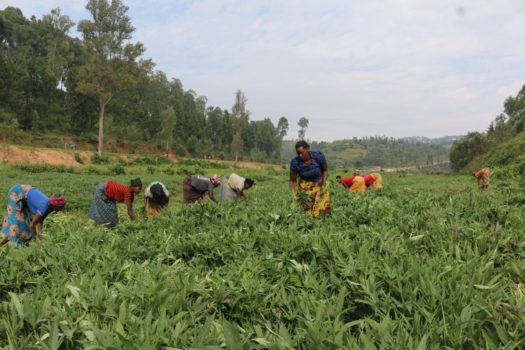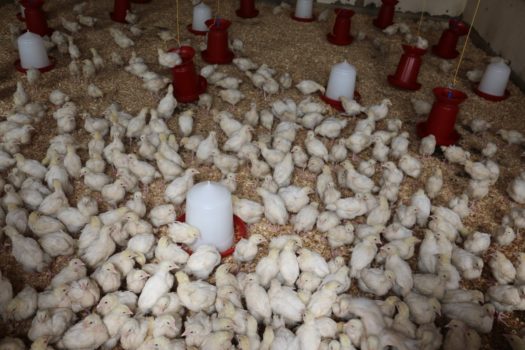As a wife and mother of six children, Karigirwa Marie Vianney started doing vine multiplication to fulfil two important goals; to raise income for her children’s school fees and above all eradicate malnutrition among children in her district.

Nyamagabe district in the Southern Province of Rwanda is known to be among the districts with highest cases of malnutrition. In Kamegeri sector, according to the monthly nutrition report of December 2018, the malnutrition prevalence rate was at 3.5% and stunting at 18%.
According to her, the idea of fighting malnutrition caught her attention when she decided to become a vine multiplier. She would generate enough income to assist her children acquire education. Her two goals were equally important. Therefore, Karigirwa knew she had to work hard and explore all the avenues of making her produce rich and healthy in nutrients through the use of poultry manure just to compliment the already nutritious OFSP vines.
“When I was approached by an International Potato Center staff, he introduced to me the idea of becoming a DVM. In his explanations, I would be able to make a lot of money from multiplying vines and he highlighted that Orange-fleshed sweetpotato is rich in Vitamin-A which is good in fighting diseases and other health deficiencies like malnutrition,” said Karigirwa.
Karigirwa believed that partnering with CIP, the local leaders and the district, her aim of fighting malnutrition among children would succeed. She wanted to be the main source of clean planting material in her area. The other benefits are that whoever planted these vines would be able to generate nutritious food as well as income for each household to acquire other basic needs.
“My husband earns only Rwf 70, 000 per month. With the proceeds from the vegetables and beans that I sold, we struggled a lot to make ends meet. With the low income from my previous farming specialization, I realized that I needed a better source of income, I therefore, decided to venture into vine multiplication with a target of working with the district and other partners like CIP so as to be able to reach every household and avail them with the vines,” she narrated.
Journey as a Decentralized Vine Multiplier
Karigirwa has been one of CIP’s Decentralized Vine Multipliers under the Scaling up Sweetpotato through Agriculture and Nutrition (SUSTAIN) project in Gakoneye Village, Kamegeri sector in Nyamagabe district.
Her journey as a DVM started with a small plot just like any other starter but with big dreams. With only 6 acres of land, she planted 8 kilograms of OFSP vines from International Potato Center. After three months, she did not sell the vines off but instead harvested and planted them on a bigger plot of land measuring 20 acres.
In the next harvest, Karigirwa made her first sale and earned Rwf 150,000. To this mother, it was surprising since previously she barely earned anything from selling local sweetpotato vines. This was also an encouragement to increase the land under OFSP and to work harder to earn even more.
While she saw a promising business potential in vine multiplication, she also made sure that members of her community benefited from it. The business has expanded with other local NGOs becoming her clients. Eventually, some local small farmers have started buying her high-quality vines for roots production. On arrival at her vine multiplication site, Karigirwa and six other casual workers were harvesting 125 Kgs that were meant to be distributed to 25 households in Kigarama Village. This village has a high number of children suffering from malnutrition. Two other clients waited patiently for 100 Kgs of vines that they wanted for planting.

Many people in her community and the neighboring areas have been encouraged to grow orange-fleshed sweetpotato as a result of her success.
“We love orange-fleshed sweetpotato because it matures within a short period of time (3-4 months), varieties like Kabode produce higher yield compared to the local varieties and OFSP roots are nutritious for our children,” said Josephine Nyirankusi, one of the workers found on field.
Achievements
The contribution towards fighting malnutrition not only makes her feel like a proud citizen but also enables her to support the less fortunate men and women to earn some money by working on her field during the times of planting, weeding, and harvesting.
During such activities, she also takes advantage of the opportunity to sensitize them about the nutrition value resulting from eating the OFSP. She then shares with them about her achievements so far as a way of encouraging them to also engage in vine multiplication or root production as a way of fighting malnutrition amongst themselves and alleviating their living standards.
She has managed to enroll her children to affordable schools; two of them have actually completed their university education while the four remaining are still in school.
From vine multiplication proceeds, Karigirwa has revived the poultry business she had failed to maintain years ago. Chicken waste has become a major source of organic manure for the vines, explaining the reasons for the good looking sweetpotato vines in the field.
Today she rears 1,000 broiler chicken as a side business and for the next phase of vine selling, she plans to increase the number of chicken. She plans to start rearing pigs which will be her third agribusiness venture.

She projects to sell over 2.5 tons of Kabode OFSP vines to UNICOOPAGI who are implementing SUSTAIN project activities of scaling up sweetpotato and nutrition in the districts of Nyamagabe and Nyaruguru.
Generally, Karigirwas’ success story represents a multitude of other such stories. It is indeed possible to benefit greatly from OFSP vines production and at the same time attain economic growth, the secret lies in embracing Good Agronomic Practices for OFSP production.